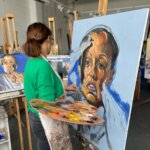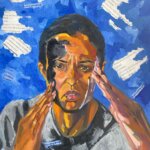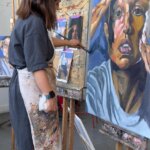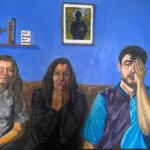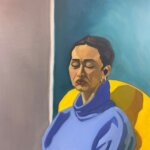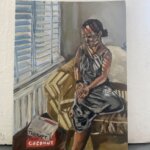Heatherleys Highlights for Black History Month
Read our first interview in a series of highlights for Black History Month celebrating the work and achievements of our Black staff, models and students. Find more highlights across our blog and social media. 👉 Follow us here.
The Colour of Self-Discovery: An interview with psychotherapist and portrait painter Annis Booker for Black History Month
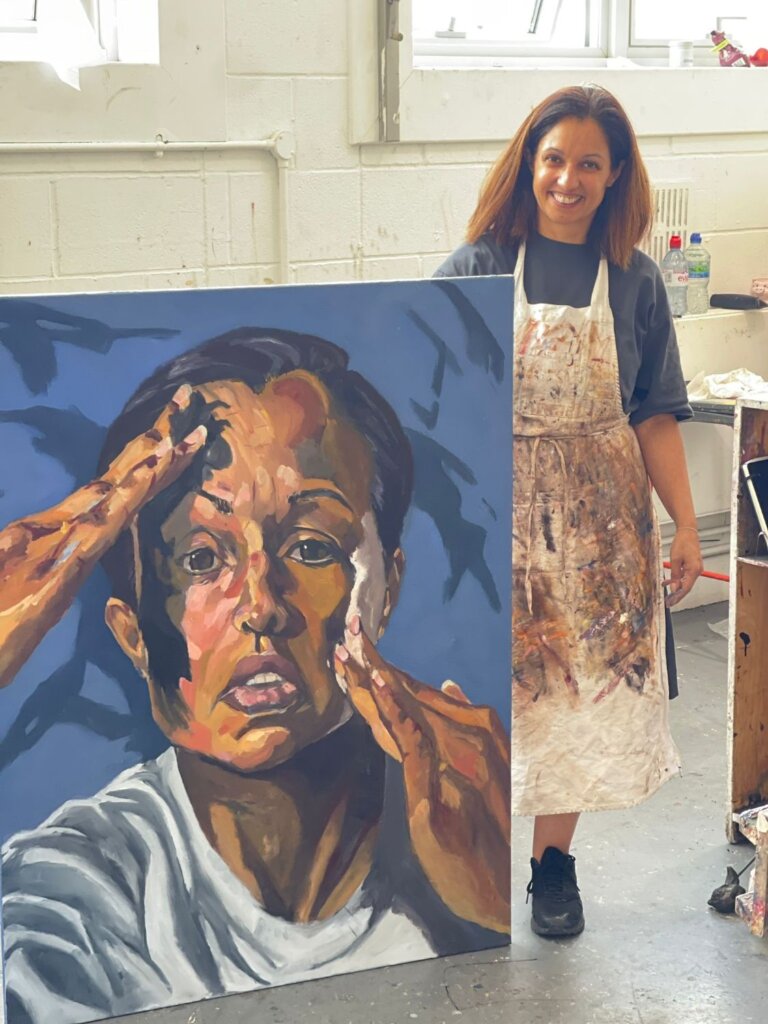
Art, identity, and personal journey intersect in my interview with Annis Booker, a psychotherapist turned artist. As life took a pause during the pandemic, Annis rekindled her love for art, a journey that brought her to the the Heatherley School of Fine Art.
From quitting art college at 17 to her latest project at Heatherleys, Annis shares her experiences, struggles and the transformative power of the creative process. Annis’s upbringing as a mixed-race person in North-East England forms a vital part of her narrative and her art. We delve into her childhood stories, her struggles to fit in, and her attempts to make sense of her identity – experiences that directly inform her artwork. As we navigate the complexities of heritage, race, and identity, Annis reveals how she uses these themes to create thought-provoking paintings.
Lastly, we explore the profound connections between psychotherapy and art. Annis shares how personal experiences shape her approach to both fields, acknowledging the role of assumptions, narrative storytelling, and the idea of ‘otherness.’ Her work serves as a medium for expressing her feelings and challenging societal norms, illustrating the transformative power art possesses. Our interview ends on a hopeful note, with Annis offering advice for those embarking on their own similar journeys.
This interview took place on Wednesday 18 October 2023 at The Heatherley School of Fine Art.
Interview time 1 hour 12 minutes. Estimated reading time 22 minutes.
Ashley Bailey
Can you tell me a bit about yourself?
Annis Booker
I’m Annis Booker; I work as a psychotherapist and I am from the North-East of England. I have been down here for approximately 20 years. As well as working as a psychotherapist I have been at Heatherleys for just over a year now doing the Diploma in Portraiture.
Ashley Bailey
We’re at Heatherleys now. Can you tell me a bit about what your day has been like here at Heatherleys?
Annis Booker
So, we’re one week in to our second project in the second year. We’re working with lovely Alice, who is pregnant currently. It’s been a good day, but a bit of struggle of a day at the same time, which is always the same for me at the beginning of any project. It’s always a bit hard going until I find myself. Probably the second week in I feel a bit more settled into it.
Ashley Bailey
What was the struggle?
Annis Booker
Working with different tutors every three weeks means learning different styles and learning different ways to work. For me it is about focusing on what new brief as I can fall back into the way I naturally paint. Also, it can feel daunting faced with a blank canvas and there is almost a nervous energy.
In the last project we were thinking about depth of space and we are continuing to think about measuring in this project, which doesn’t come naturally to me. I usually paint by what I feel and if I don’t think it looks right, I just keep altering until I am happy with it. So, I have to keep coming back to what the tutors are showing us and keep trying out different ways of learning.
So, I think it is just settling into it. That is kind of the main struggle with it. But, as I say, I’m three days in now, which is the first week. So, by next week I’m expecting, as things have been in the past, that I’ll feel much more comfortable in it as we go along.
There is a want. It’s weird, it’s like a struggle, but also like a wanting to get on. Maybe wanting to be further on in the process, I think, is part of it. But you can’t have that at the beginning – for me it’s a bit messy. When you look at something, that looks messy, it’s difficult to think it’s not always going to look like this, and it could look better. However, I have the want to engage in the process is what brings me back.
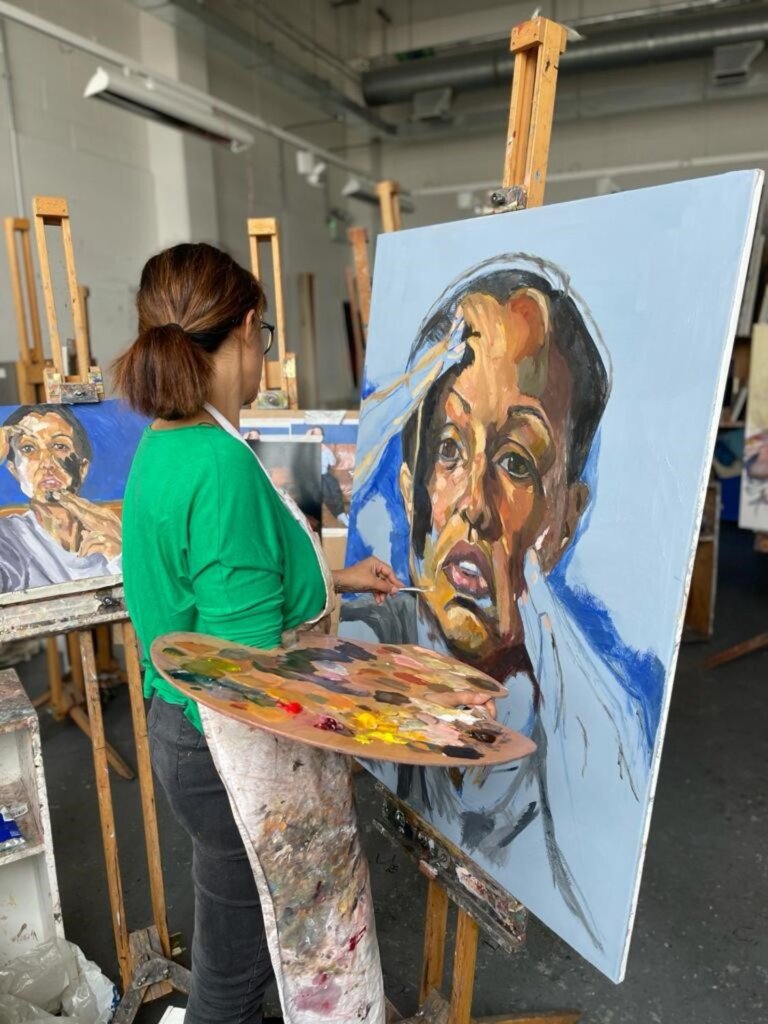
Ashley Bailey
How did you come to art, or how did it come to you?
Annis Booker
Well on my dad’s side there are some good artists. My dad is a good artist. He got a scholarship to go to college but he’s since told me he didn’t feel confident when he saw peers work. So, he never went to art college and instead became a barber. I was never that great at school but have always loved art. So, I decided this was something I wanted to do when I left school. I went to a college in Newcastle but dropped out of my course after about four months.
I don’t think I was, at the time, ready for art college. I was not mature enough to put myself in that situation. I think it’s vulnerable to be at college and have someone giving you feedback on your work. I think I found it too exposing. So, I left and hadn’t really done anything art related for the following three decades.
I went on to do an occupational therapy degree. After having my two children I then went on to do a Masters in psychotherapy. It wasn’t until Covid hit, the whole family were at home and my daughter at the time was doing her GCSE Art on the kitchen table, helping her keep on going with her GCSE artwork actually got me more into it. I then began to engage in drawing and painting I think because there was so much uncertainty, I just needed something for myself. I just needed some kind of outlet.
Then a few friends asked if I would do this painting and drawings. I didn’t feel any pressure. Then I thought maybe I should go back to art college. I thought that maybe I was more prepared now than I was then. I remember my interview with Minna, because that was online, and I remember towards the end of the interview I said, “if you think I need to do some other courses first, then I will,” because I hadn’t done any short course or anything. I said, “But, obviously if you think you need something else, then I’m happy to go and do something else and then come back.” But, luckily, she took me up.
But, it was daunting, I have to tell you, walking into a studio after 30 years but, I am pleased to have done it. But I have said to my family this will be my last training, this is like my third training!
Ashley Bailey
What are those trainings?
Annis Booker
I did occupational therapy, so that was a three-year training. I didn’t really do occupational therapy for very long. But, then, I just thought, I’m not sure this is for me. I was more interested in people’s narratives. I have always been interested in people so then I did my psychotherapy training. I’m pleased to have done my training and enjoy my work. Then I came to Heatherleys and I do see portraiture as very similar to psychotherapy. They are a good fit. Because for me both are about dynamics, narratives, and emotions.
I just kind of ran for the hills. I literally left my art caddy, my art portfolio. I just didn’t return.
I thought, this is not for me.
Ashley Bailey
You mentioned that you didn’t feel ready when you first went to your art course at 17. What changed?
Annis Booker
I think, life experience, I don’t know, but for me you have to have it internally. You have to have that kind of endurance really and resilience and at 17 I don’t think I had that resilience to really have somebody view my work. I was a bit like, I just kind of ran for the hills. I literally left my art caddy, my art portfolio. I just didn’t return.
I thought, this is not for me. I just can’t bear to hear what my tutor had to say, and I saw him a couple of years ago and I told him I have gone back to art college and he said, “I’m just so pleased”.
He said, “I don’t know you I left.” I was so fearful of what he would say about my art. Now I look back and see I had distorted things. Being older and having had different work experiences I feel more ‘solid’ in myself to re-engage. Also, it is hard when you open that box again and realise how much you engage art and you don’t want to close it off again.
Although Covid and lockdown was in so many ways a very uncertain and difficult time it did give me time to pause – or my daughter doing her art work at the kitchen table – it could have been a different story.
Ashley Bailey
That sounds like you’ve got a really creative family.
Annis Booker
It’s interesting, isn’t it? Because history repeated in some ways. My dad didn’t engage with art because he didn’t have the confidence when he left school and I also dropped out not feeling ready. However, I feel happy to have got back to it. My daughter is good at art but now is doing a psychology degree. Maybe she might go back to it, or not. Maybe she will stick to the psychology.
Ashley Bailey
So, you’ve influenced each other.
Annis Booker
Yes, we have I suppose.
Ashley Bailey
What made you choose oil painting?
Annis Booker
I thought these will be a challenge. There is something quite meaty about them. Also, although I don’t paint in a traditional way. I associate oils with tradition. Maybe I like engaging with things which feel traditional but using them in a different manner. I’ve never really used watercolour, but I find watercolour a bit scarier in a way, because I feel you have less control over the paint.
The thickness of the paint and putting down marks, I don’t like feeling the paint is going to start drifting about in an out-of-control way. I like the fact oils take time to dry, so if you do not feel happy with the placement of the paint you can move. You never know, I am saying this now, but maybe I might be back to do a course in watercolour when I have finished this.
Ashley Bailey
You never know. Heatherleys is one of those places where people, once they start coming here, they never leave. [1]
I learnt quite quickly, just to make up narratives, I guess because I realised early that people like something certain, something that makes sense to them. They don’t like this kind of unknown…
Ashley Bailey
So, you told me that you grew up in North-East England. It’s funny that you said that you were in Newcastle. My grandad was from Newcastle.
Annis Booker
Oh really!
Ashley Bailey
Yeah, what was it like growing up in North-East England?
Annis Booker
In some ways it was very nice. My dad’s family are all from Newcastle. My mum’s family are from Durham, so we lived in Durham about, 20 miles from Newcastle. At home in my village where my grandmother had lived most of her life and my mother had lived all of her life. I felt safe and had happy times. As we were a mixed-race family, I did have any questions within the family.
But growing up in the North-East in the 80’s attending a Catholic school was challenging. I have two siblings who are both white they were already at school by the time I started. My mere existence seemed to be puzzling for others around me in my school. I just remember entering school and being among only white children, there was nobody who looked the same as me. No teachers who were not white. And then of course my sister would come up and my friends would be like who’s this? And I’d say, “she is my sister”.
This would set off the questions. Have you got a different dad? Are you adopted? And all these kinds of questions. I learnt quite quickly, just to make up narratives, I guess because I realised early that people like something certain, something that makes sense to them. They don’t like this kind of unknown, such as, I don’t know where the colour comes from, but we are from the same parents.
So, yeah, I used to make up all sorts of things like telling my friends that my mum got pregnant when mum and dad went to Spain. I don’t know why I said this but it seemed to satisfy them.
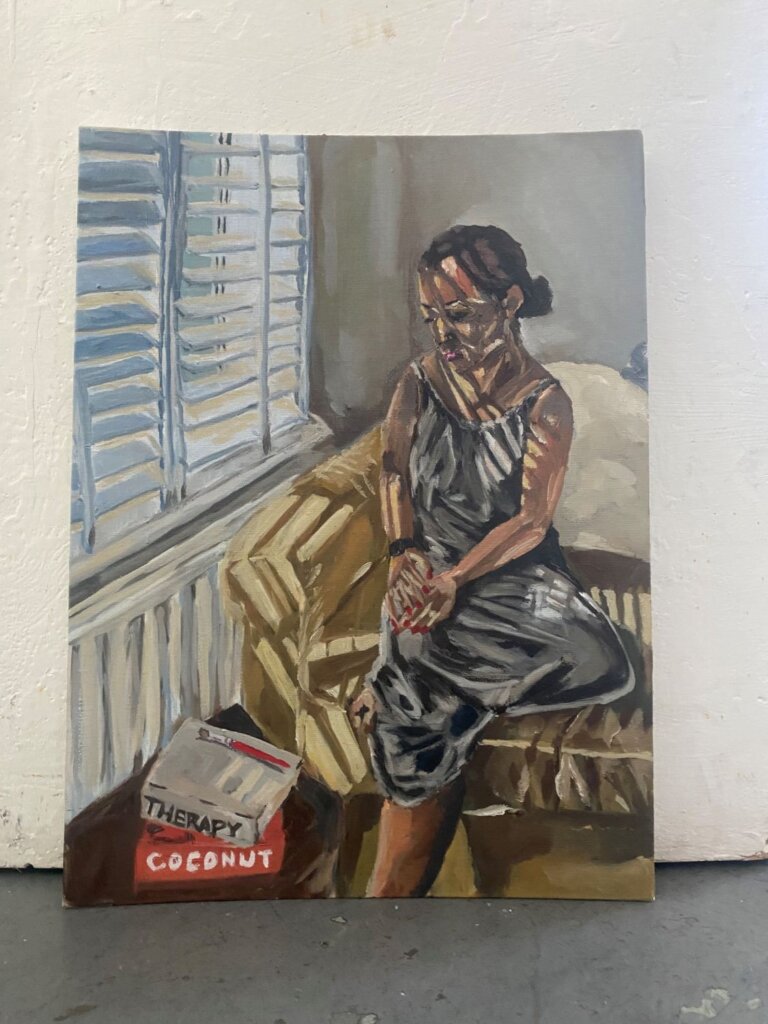
It was difficult, I think, because my siblings are white. Genetics are interesting. But people do struggle with it, so there was definitely times where I just wanted to be invisible but couldn’t be invisible. I just wanted to blend in.
Also, as a side note my mother was a hairdresser, she herself is creative. She would come to the school gate with a ‘Chelsea Skinhead’ and her fringe would be electric blue! Well, it would change all the time actually her hair colour. My mum isn’t white so I like this as people would know she was my mother. But she would wear flamboyant clothes and change her hair colour regularly. So, children would say, “is that your mam? She’s got blue hair.”
Sometime before parents evening, I would be asking her what she was wearing, wanting her to be like other mams. I’d say: “Just wear something, you know, just like all the other mums. Don’t come in these flamboyant outfits.”
But, when you are a child and you’re trying to fit in, I felt she was drawing more attention. She would tell me, “You should, please, just be individual, just be yourself.”
I’d think, “Well, I just want to be the same as everybody else.”
So it was, and it was tricky. But my sister also had it tricky. She came home because she heard two mums talking and saying oh, you know, she was adopted, and our mam was not her mother. We all had our struggles in different ways.
I remember my teacher at the time, was like, “you could be Tina Turner.”
It was supposed to be a funny interlude.
I was a shy child, there was no way I would ever have been able to do this. But I knew she had picked me because of the colour of my skin.
…I like Tina Turner, but at 10 years old I didn’t want to be the interlude, the funny little bit.
I still get questions about where I am from, in some ways I think it’s a very normal thing to ask someone where they are from. But there is something about that question from me that feels so difficult and uneasy. As I know, if I actually just say the truth, which is, “well, I’m from Durham.”
This rarely satisfies people. They will then ask, “but where are your family from?”
Not knowing certain aspects about my heritage, I sense sometime people feeling I am hiding something or for some reason want to withhold something when the reality is I don’t know. I think there’s always been that kind of question, wherever you go, when you meet new people. People are curious, aren’t they? And it’s not necessarily that they are being negative or anything. I suppose I don’t fit in with their view of the world; my existence throws what they thought they knew about others and this seems something difficult for people to reconcile.
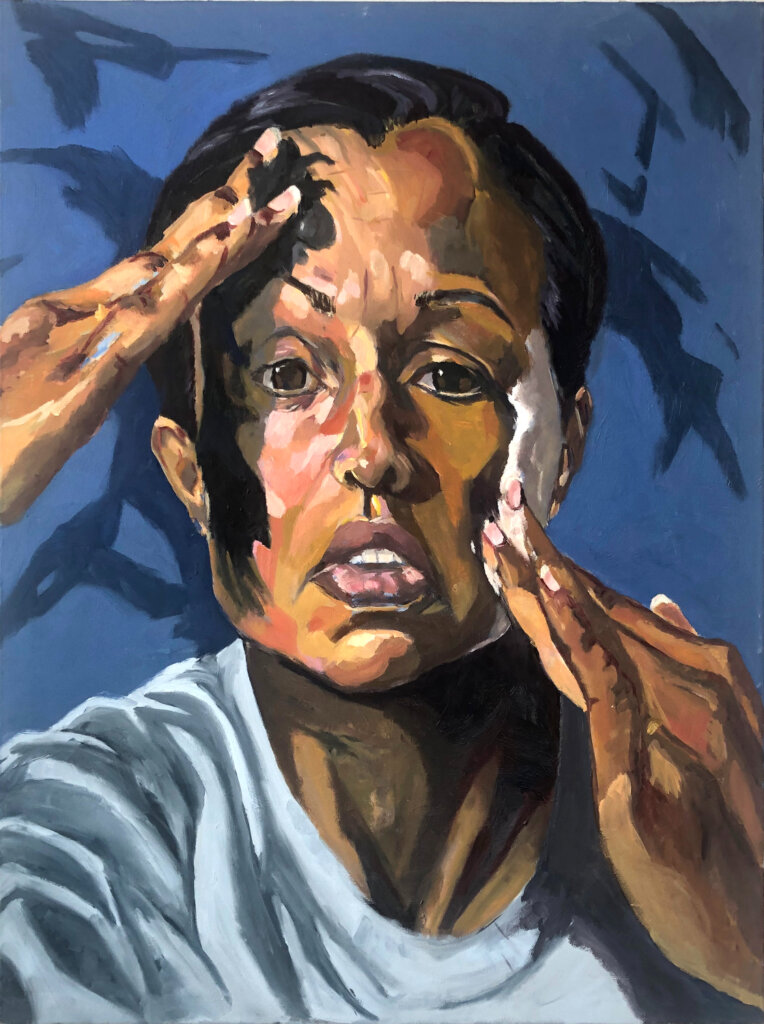
I think as a child being the only non-white child in my class at primary school, I just knew I would never be able to do certain things. Being in a Catholic school we did a nativity play each Christmas. I knew from early I was never going to get the part of Mary for instance as I didn’t have the blonde hair and blue eyes. I might get to be an angel if I was lucky! I remember when I was about 10 there was a big advert on telly with Tina Turner for Pepsi Max and she would sing “you’re simply the best.”
I remember my teacher at the time, was like, “you could be Tina Turner.”
It was supposed to be a funny interlude.
I was a shy child, there was no way I would ever have been able to do this. But I knew she had picked me because of the colour of my skin. I remember saying I didn’t want to do it and her being really upset about it. This other girl offered to do it who enjoyed performing but the teacher was like, “we aren’t doing that now.”
Ashley Bailey
I mean, I’m not against putting Tina Turner in a nativity, but I can see how you’re about that way.
People do make those associations. People have compared me to Tina Turner as well, because I’m also mixed race and have big curly hair.
Annis Booker
I like Tina Turner, but at 10 years old I didn’t want to be the interlude, the funny little bit.
I try not to make quick judgements or make assumptions about others. I also think it allows me to sit in the uncertainty, which can be difficult. For my art work, I think it has led me to wanting to explore the world of others in a meaningful way. Not just what we see in front of us but to use paint to help create someone’s narrative. There is something about allowing everything on the canvas, just like, as a therapist, I want to allow the whole person in the therapy space. I don’t want an idealised painting but something which is real.
Ashley Bailey
How do these experiences inform your work?
Annis Booker
I try not to make quick judgements or make assumptions about others. I also think it allows me to sit in the uncertainty, which can be difficult. For my art work, I think it has led me to wanting to explore the world of others in a meaningful way. Not just what we see in front of us but to use paint to help create someone’s narrative. There is something about allowing everything on the canvas, just like, as a therapist, I want to allow the whole person in the therapy space. I don’t want an idealised painting but something which is real. I am currently working on a series which is my attempt to explore my own experiences and find a way to put them on the canvas.
Ashley Bailey
Can you tell me a bit more about this project you’re working on?
Annis Booker
So, it is a series of eight self-portraits about my personal experiences as a mixed-race woman. Some ideas are around what I have directly experienced but others aspects of the painting are questioning things in society. I suppose my series is partly cathartic, but I also want to communicate my experience to open up people’s views and get people thinking about the assumptions we can make and the expectations we can have.
Currently it is a series of eight. However, it might get bigger. What I have found is that part way through doing a painting another idea comes. Currently I have the first one which I created here in my first year with Sarah-Jane Moon. This is being exhibited at Worlds End Studios titled The Struggle with Colour. The second one is currently exhibited downstairs (at Heatherleys) and is my painting for the Mr Heatherley project. This painting includes my two children and a silhouette of my great grandad. I am using symbolism in this painting as a way to communicate things that I know and what I don’t know about my heritage.
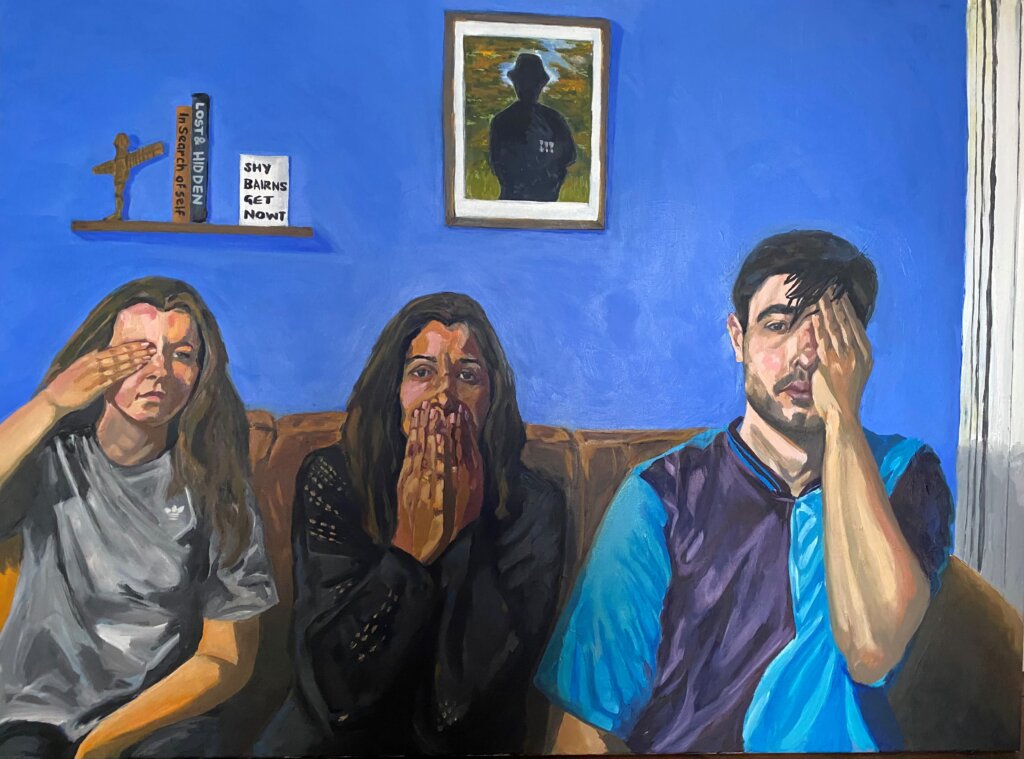
My great grandad is included in the Mr Heatherley project. I have only painted his silhouette to indicate he is a vague figure in my narrative. I only have one photograph of him – I can see he is a black man and that he was in the war as he is wearing his war medals but apparently, he refused to talk about his own narrative when asked.
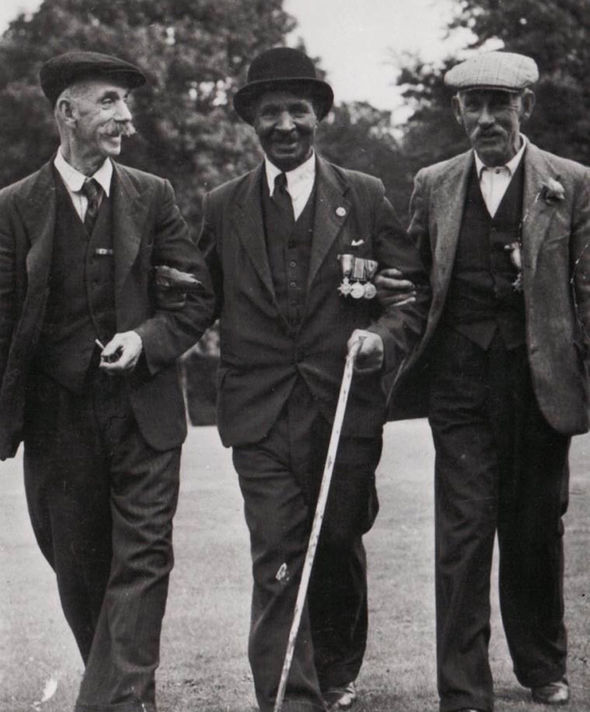
I do have sympathy as I can’t imagine what it was like for him back then. I know he was called ‘black Geordie.’ I don’t know how he felt about this, I think it must have been, at times, difficult for him.
Ashley Bailey
For those in the middle it can be difficult to orientate yourself when they’re all this unknown.
Annis Booker
Yes, it can be, also sometimes I think it would be nice to have had something from the unknown handed down. Traditions and celebrations that I could enjoy and possibly hand down to my own children.
Ashley Bailey
You mentioned that you wrote about this, about your heritage and not knowing. Can you tell me a bit about that article that you wrote?[2]
Annis Booker
Well, I’m quite dyslexic, so I’m not keen on writing, but my husband’s a journalist and he suggested I write something. I didn’t really know how to write something like that. He suggested I just write everything out as if writing in a diary. So, I just splurged everything out and then just kept chopping back until I was happy with what I had.
I got a lot of positive feedback, people contacting who I had known saying they had not realised how it was for me and people I didn’t know voicing they could relate.
It was a challenge. I think, anything, whether it’s art or writing or anything where you’re trying to get something personal out, is quite difficult because, you’re like, “how do I express that element?”
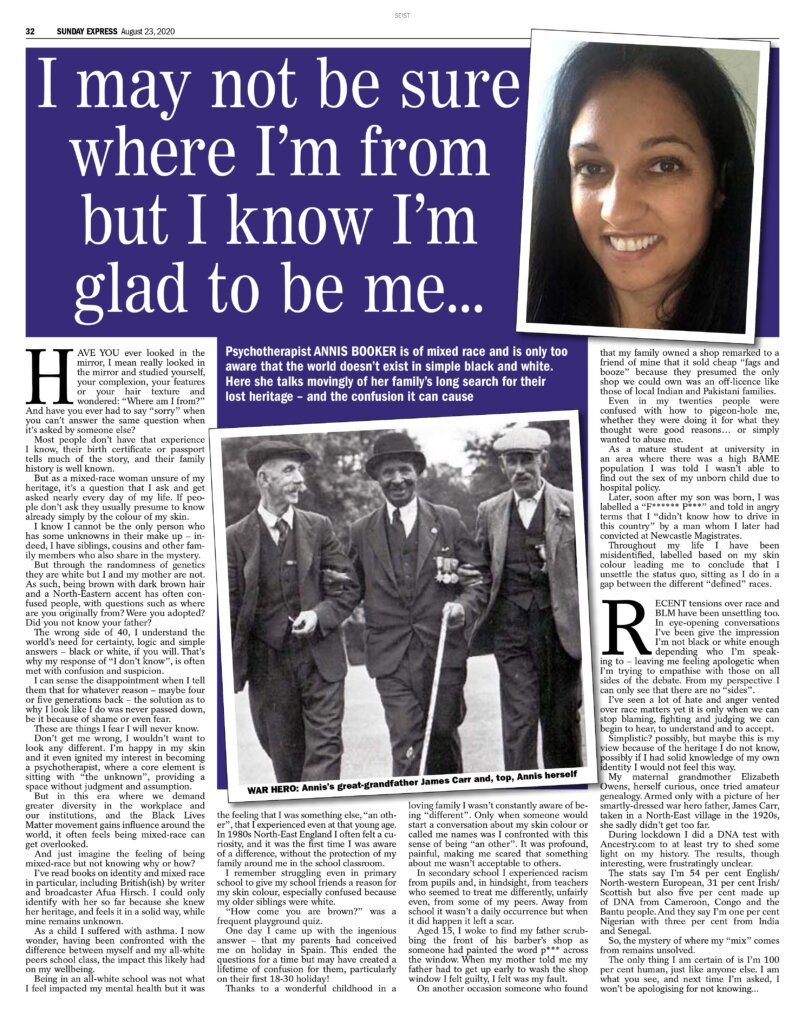
Ashley Bailey
Yes, that’s the power of art, the power of a portrait, whether that is a portrait of yourself or the portrait of someone else, whether that is a written portrait or a painted portrait. It’s the power of attention, of paying attention to someone else, of giving that person attention, a platform.
Annis Booker
Mmm, a platform.
And that’s really like, I really like, Alice Neel. And I think there is something about, I guess, looking at the social differences which is of interest to me. It is not just about race but other relevant differences that I notice and are of interest to me. I want to communicate with my art and want to be able to paint portraits of people which is not just for people who can afford to pay for a painting of themselves. Which is the same as my psychotherapy practice, I normally work privately but think it is important to try and make is accessible for everyone so sometimes I work in organisations and offer some low-cost therapy.
Ashley Bailey
You make your practice accessible, to give access to people who might not otherwise have access to therapy. Does that come into your art practice?
Annis Booker
I am just in the early stages as an artist, so I am not really sure. But for instance, I like to paint people I come across every day. Recently I did some sketches of a lovely gent who is 87. I see him at the local pool.
He just seemed a really interesting person. We talk most weeks, and he tells me about his life as a child and later his working life in the press. I think I was so drawn to his narrative. I then wanted to draw him, and this might be turned into a painting at some stage. He was a child when the Second World War was coming to an end so maybe I might include some objects to indicate this.
Ashley Bailey
Would you say that’s a reflection of the kind of artist that you want to be, that approach.
Annis Booker
Yeah, I think so. I think it’s early days and things could evolve. But this is where I am right now.
Ashley Bailey
It will be interesting to see what you do next. What are you looking forward to in the next year?
Annis Booker
I’d have to say I feel like it’s such a fertile ground at Heatherleys. So, just being here and engaging with different tutors and working on different projects is exciting for me. I am hoping to complete the series I am working on outside of Heatherleys also.
I want to try and combine my work as a therapist with my work as an artist. Trying to somehow put something of depth on the canvas which is more than a likeness but to capture a truer sense of a person.
Ashley Bailey
That could be an interesting project, sort of combining that experience that you have with facilitating someone opening up about themselves and their experiences and expressing that in a portrait and a painting.
Annis Booker
Yes but, I am aware that it might also be a big ask for a sitter.
Ashley Bailey
That could be your unique thing, that you bring as an artist.
Annis Booker
I think people’s narratives are important and something I would like to include, but it will be a challenge. How do we use paint to communicate a narrative? Is there some way we can engage that?
Ashley Bailey
Is there? How would you answer that question?
Annis Booker
Yeah, I think there is. You know, there definitely is ways with like objects or something which is like significant to the person or aspects of their identity. I suppose it becomes much more of a collaboration. Which is why it feels a big ask.
…it’s daunting and exposing especially when you have been painting something personal. I think any kind of creative process is wonderful because it’s your personal experience.
Ashley Bailey
If there was one piece of advice you could give to someone starting on a similar journey? Perhaps who had a similar experience or similar background to you.
Annis Booker
To give it a go and not to be so afraid, I guess, of other people. Or, you know, if people have similar experiences, it’s alright for you to be different or not fit with what others expect. Stay true to yourself. I think that will be my best advice.
Ashley Bailey
That kind of reminds me of a conversation I overheard you having with your tutor, Sarah Jane Moon. You were talking about the crit that you’re going to have on Monday and how you’re feeling about that. Could you share?
Annis Booker
Let’s go back to when I was 17. I’m not going to just kind of take my canvas and run out of here. Leave a big gap in the exhibition and people saying she just upped and left. Of course, it’s daunting and exposing especially when you have been painting something personal. I think any kind of creative process is wonderful because it’s your personal experience.
Anthony Connelly is coming, and he will critique our work. Hopefully I will learn something and maybe take something away from the critique. I also think you could have 20 different people, artists, come in and they all might have a different perspective.
I think it was Alice Neel who said her canvas is her world. I don’t know if she did say that. If she didn’t, and no other artists said it, then you can say that I said it.
(Laughter)
Ashley Bailey
Haha, okay. For sure, I’ll check that, and if no one else has said it then I’ll quote you.
Annis Booker
I’m sure Alice Neel said it, or David Hockney might have said it. My canvas is definitely my world. So, people will have thoughts, some might be positive some may be negative. At the end of the day people can choose to look at a painting, maybe, if you don’t like it, don’t look.
(Laughter)
Ashley Bailey
Haha! And that’s that! We’re going to have to wrap up in a bit. Is there anything else that you would like to add? Is there a question that you wish I’d asked?
Annis Booker
Oh, you’ve asked a lot of questions, Ashley. No, I don’t think there is anything. I think we’ve done quite a thorough job, after a whole day of painting, don’t you think?
Ashley Bailey
Well-done. Well done us.
Annis Booker
Well done us. We got there.
Ashley Bailey
Speaking of where you’re from or where you can be found. Where can people find more about you and your work?
Annis Booker
My work is on my Instagram @drawingonemotions and The Struggle with Colour is exhibited at the World End Studios currently.[3]
[1] Not in a dark, Hotel California kind of way. The sense of community here at Heatherleys is so strong and the standard of teaching so high that people keep coming back. Many part time students go on to Diploma courses and several of our tutors used to study here too.
[2] Annis explored the topic of unknown heritage writing for a national newspaper. Read the article here.
[3] Annis Booker’s painting The Struggle with Colour was exhibited at Worlds End Studios from July through October 2023.
Interview by Ashley Bailey
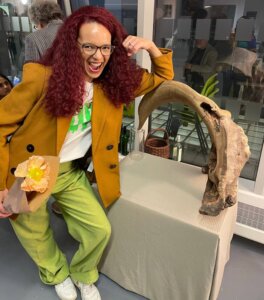
Ashley (she/her) is of mixed British and Jamaican heritage. Her favourite book, film and colour are all The Colour Purple and she has a cat named Raja. At Heatherleys she manages our Digital Marketing & Communications. Ashley is also an artist, freelance writer, yoga teacher and occasional model. Her current work is in woodcarving, ceramics and the written word. She has a BA (Hons) in Fine Art from Central St Martins where she worked in sculpture, performance and digital media, exploring themes of identity and relationships to the self and the other.
See here for more of our highlights and interviews for Black History Month 2023.
